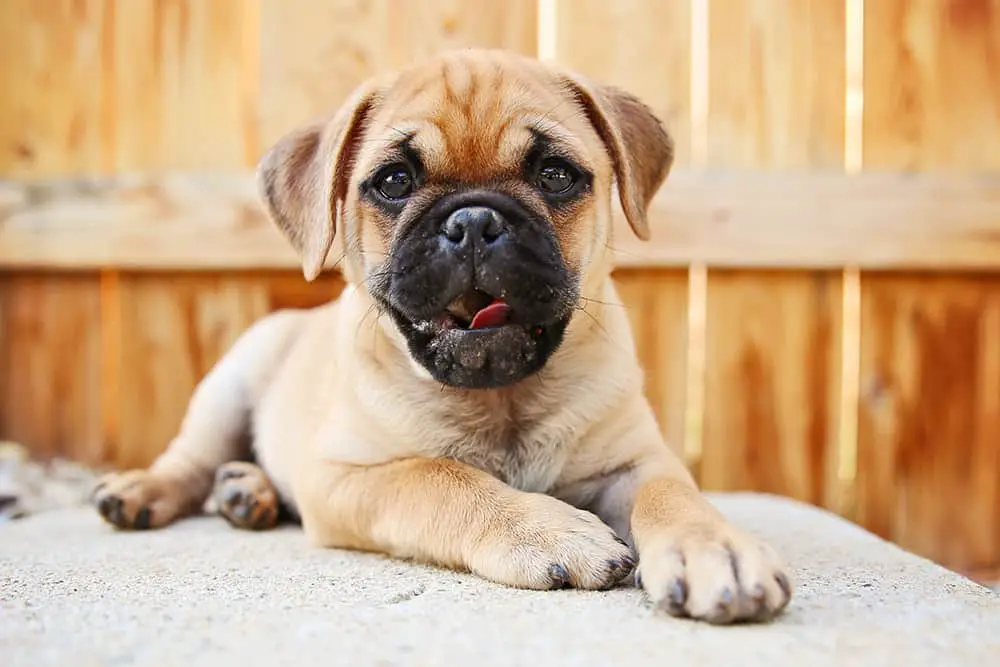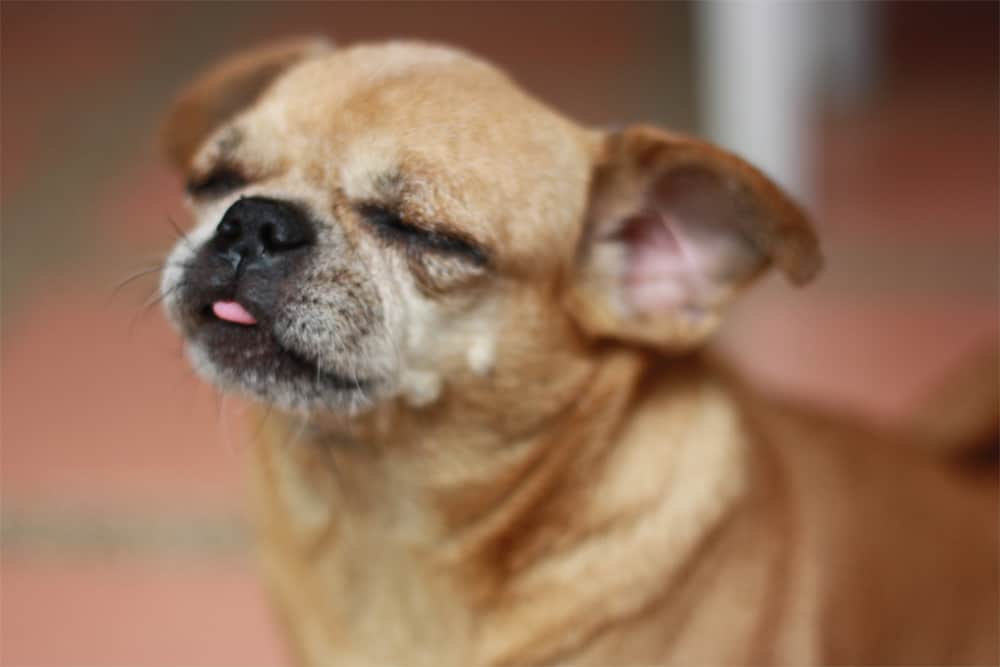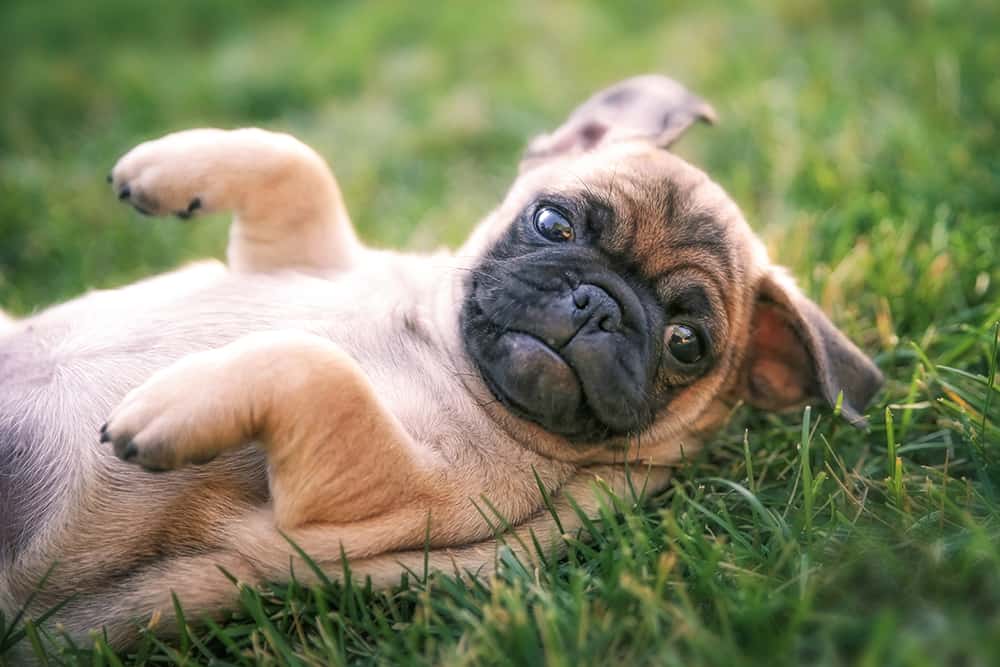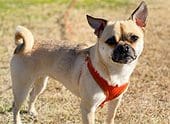The Chihuahua Pug mix, also known as a Chug, is a loveable hybrid of two of the world’s most popular small dogs.
When two breeds of dog are bred together to make a hybrid, the puppy exhibits attributes from both parents, which is ideal for those who can’t decide which breed is right for their home.
Can’t choose between a Chihuahua and a Pug? Go for a Chug!

Chugs are an excellent choice for those who love a playful, funny, intelligent, and friendly small dog. Of course, as with all hybrids, Chugs possess the somewhat negative attributes of their parents, such as barking and laziness.
Despite this, Chugs have proven to be one of the best mixed breed dogs to have as a companion and family member.
If you’re looking to buy or adopt a Chihuahua Pug mix, here is what you need to know about this dog!
What Is A Chug?
To better understand the mixed breed, let’s take a look at the Chug’s parents: a Chihuahua and a Pug.
It’s important to remember that no two mixed breed dogs are the same, even if they come from the same parents, so it’s impossible to say whether a Chug will be more like one parent than another!
Chihuahuas
- Height: 6-9”
- Weight: 0.9-1.8 kg
- Lifespan: 12-20 years
What Chihuahuas lack in size, they make up for in bucketfuls of personality. Named after the Mexican city of Chihuahua, these dogs are the smallest breed of dog recognized by the American Kennel Club.
There are several types of Chihuahuas, each ranging in coat type and the shape of their head, but in most cases, Chihuahuas are most distinguishable for their big, round eyes.
Chihuahuas are full of personality. These dogs are incredibly intelligent, good to train, very affectionate, friendly with people, and very easy to maintain in terms of cleaning and waste management due to their size.
However, Chihuahuas are feisty dogs that are known to bark a lot (especially when someone comes to the door) and they can get territorial around other dogs. Without strict training, it’s unfortunately quite common for Chihuahuas to get aggressive around other dogs.
Pugs
- Height: 9.8-14.2”
- Weight: 6.3-8 kg
- Lifespan: 12-15 kg
Pugs are another member of the toy group alongside Chihuahuas, and they have become one of the most popular dog breeds in the world for their hilarious personality!
These dogs are known for their unique appearance of a muzzled, flat, and wrinkly face, big and round eyes, and curled tail. These dogs are slightly thicker and bigger than Chihuahuas.
Pugs are basically the chilled out version of Chihuahuas. They are equally intelligent and friendly, but they are less prone to aggression and far more likely to relax on the couch all day.
This laziness is ideal for those who like to cuddle with their dogs, but when they want to play, they suddenly turn into a ball of energy. Pugs are also known for being stubborn and can come into a myriad of health issues due to the shape of their face – particularly breathing problems.
Chihuahua Pug Mix (Chug) Breed Profile
As the breed is a hybrid, the Chihuahua Pug mix is not recognized by the American Kennel Club.
Despite this, due to the popularity of both Chihuahuas and Pugs, the Chug has become a popular and widely sought after breed in the United States.

While most hybrid breeds are affordable compared to their pedigree parents, it’s common for Chug puppies to cost quite a lot of money because of their popularity.
Before you buy or adopt a dog, it’s vital that you do some research on the breed. This will include the breed’s temperament, size and weight, life expectancy, dietary requirements, exercise needs, and any potential health problems.
Chug Appearance
As you can imagine, a Chug is almost an exact mix between a Chihuahua and a Pug when it comes to height and weight. On average, these dogs have a height of 6-12 inches and a weight of 10-20 pounds.
They aren’t as chunky as Pugs, but certainly bigger than Chihuahuas. Chugs will exhibit the distinctive large and bulging eyes, wrinkly cheeks, droopy ears, and small muzzle. This means that Chugs are a brachycephalic breed.
Chugs can exhibit a single coat that is smooth and short, but this doesn’t mean they are hypoallergenic. They shouldn’t shed too much if you groom them regularly.
However, some Chugs come with a double coat that means they will shed all year round. As for the colors of the coat, Chugs come in all variations, including black, white, brown, fawn, and a mixture.
Chug Temperament And Behavior
Chugs are notoriously needy dogs. They absolutely love attention – whether it’s through cuddles and scratches or playing a game of tug-of-war – so they should only go to a family that can commit to this neediness!
As a result of this, Chihuahua Pug mixes can be an anxious dog, mostly experiencing bouts of separation anxiety if they are away from their owners for too long. This is inherited from the Chihuahua parent.
Chugs are far friendlier than Chihuahuas, which means they love to meet new people and other dogs and pets.
They aren’t prone to running away on a walk as they are so loyal and obedient – but they are stubborn, so if they want to smell something far away, nothing will stop them.
Like their Pug parent, Chugs are notoriously funny. These dogs are noisy – not just in the sense that they will bark, but they will make noises when they yawn, when they want attention, and when they play.
These noises often come across as growls, but they’re not an aggressive breed. They will also snore.
Exercise Requirements
Chugs are small dogs, which means you won’t have to commit to extensive exercise routines. One walk a day will suit their lifestyles just fine, with the occasional trip to the beach or short hike.
Chugs are notoriously lazy as they get older, but as soon as you get the leash out, they’re likely to regress into their younger, energetic self.
Dietary Requirements
Chihuahua Pug mixes are fairly easy to feed. The general rule when feeding any breed is to provide their food according to their size and age.
High-protein and low-carb diets are the best diets to maintain a healthy weight, so it’s worth spending more money on organic food rather than the cheap, filler-filled foods. Pugs are prone to obesity, so try not to overdo it with the treats.
Plus, both Chihuahuas and Pugs are prone to overcrowded teeth due to their small jaws. This means that you should feed your Chug kibble and dental chews to prevent food from sticking between their teeth, causing gum rot.
Training
Like their parents, Chugs are fairly straightforward to train. These dogs are eager to please and are incredibly loyal to their owners, but it’s still important to commit to proper training from a young age.
Obedience classes are brilliant because they encourage young dogs to socialize with other dogs whilst learning basic commands.

The best way to reward a Chug when they have completed their training successfully is with treats rather than toys. Just make sure not to overfeed your dog, because they will become expectant of treats and might gain weight.
Grooming Requirements
Chugs are pretty easy when it comes to grooming. If they have a single coat, you won’t have to worry too much about shedding.
Those with a double coat, however, will need to be groomed frequently with a wire brush, as this will prevent shedding in the next few days. You’ll also need to get used to vacuuming your house almost every day – especially if you have a white Chug!
Chugs will need their nails trimmed, their ears cleaned, and their teeth brushed. It’s also important to wipe between the wrinkly lines on their face, as food and debris can often build-up there. If these oils stay there for long enough, it can lead to infections.
Health Problems
Fortunately, Chugs are generally a healthy breed if their parents were healthy.
It’s vital that you ask for the medical records of the litter’s parentage when you buy your puppy, because this will highlight any potential health problems – plus, reputable breeders are more likely to show medical records than backyard breeders.
Here are some health problems that Chugs might face:
Breathing Problems
Pugs often have respiratory issues due to the shape of their face, and the same goes for Chugs. These dogs are brachycephalic, which means the shape of their skull contributes to their flattened noses.
Chugs can experience difficulty breathing, such as breathing irregularities, heavy panting, snoring, and snorting. It’s important to not over-exercise a Chug as they cannot inhale enough oxygen when they are panting.
Obesity
Like we said, Chugs are notoriously hungry dogs that will happily eat as much food that you give them and more. Overfeeding your Chug can lead to obesity, which can result in heart problems, joint pain, and arthritis.
Eye Problems
Due to the shape of their head and eyes, Chugs are prone to eye problems such as dry eyes, cataracts, cherry eyes, entropion, and progressive retinal atrophy.
It’s important to keep sharp objects and corners away from a Chug due to their protruding eyes, which can be easily scratched.
Who Should Have A Chug?
Chugs are an extremely adaptable breed that can live in virtually any household – just as long as the household can commit to providing endless attention to the dog. Without all of this attention, Chugs can develop severe social anxiety and might become destructive in the house.
As a result of this, Chugs are best suited for families where there is almost always someone in the house. Their temperament and size also makes them the perfect family dog for children, which is the ideal introduction for the children into the world of dogs!
On the other hand, Chugs are perfectly suited for elderly couples or single households. If you work from home, a Chug will happily snooze alongside you as you work – plus it means you can have constant cuddles whenever you like.
Where To Find A Chug
It’s no secret that the most ethical way to get a dog is through adoption or rehoming. However, as Chugs are quite a popular hybrid, it’s rare that you’ll find one in a rescue shelter. This means your only option is to purchase a Chug from a breeder.
It’s essential that you only buy a Chug from a reputable breeder. Reputable breeders will provide all the genetic testing and medical checks of the litter’s parents as well as the puppy’s veterinary certificates.
The puppies should come wormed, microchipped, and will up-to-date vaccinations, and they shouldn’t be sold earlier than 8 weeks old.
Backyard breeders will do the exact opposite – they will sell puppies at a young age with no medical checks, no worming, no microchips, no vaccinations, and very little socialization skills. Buying from a backyard breeder means that you run the risk of purchasing a sick dog.
Conclusion
So, there you have it! Chihuahua Pug mixes are one of the best small hybrid dog breeds for families and single households alike. As long as you can commit to their attention requirements, you’ll be met with a happy, loyal, and ever-so friendly dog in return.




